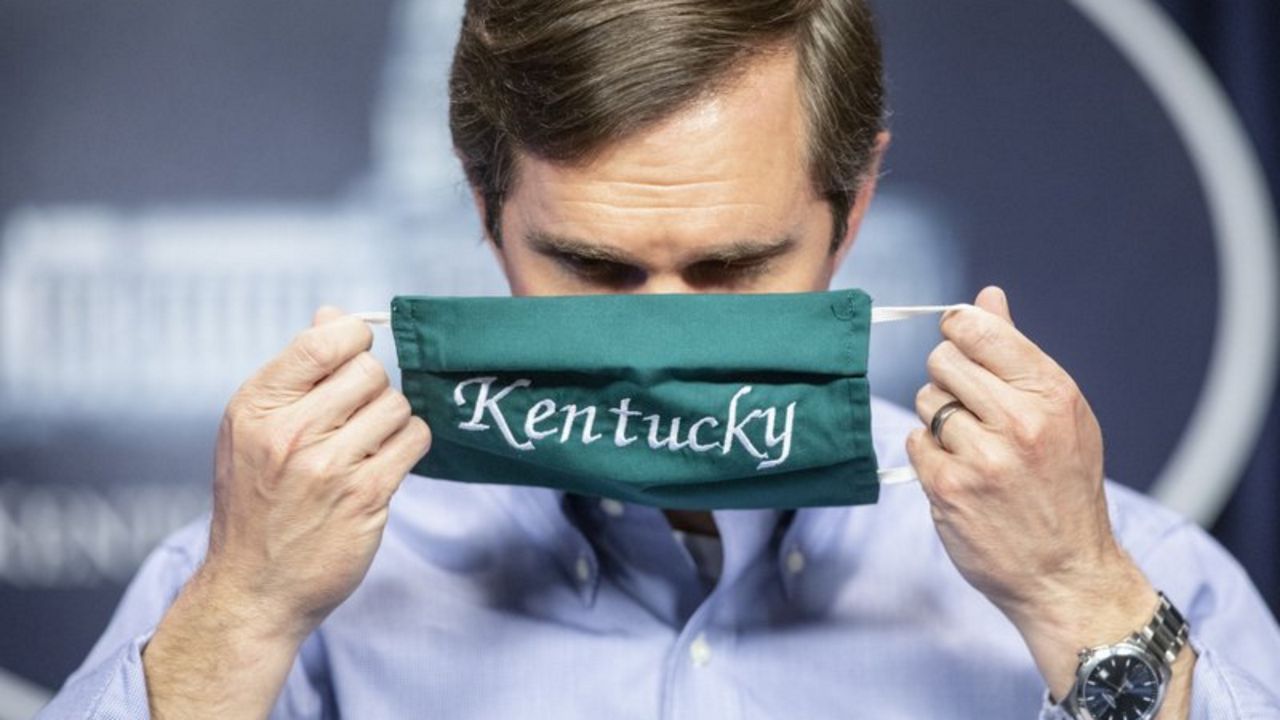FRANKFORT, Ky. (AP) — Gov. Andy Beshear won a quick court order Wednesday to temporarily block a new law that he argues would dangerously weaken the state’s response to the COVID-19 pandemic.
Hours after an initial court hearing, a judge issued a restraining order to halt one of the three new laws being challenged by Beshear. Franklin Circuit Judge Phillip Shepherd said the law could create “chaos” and confusion about measures intended to combat the deadly disease. He ordered that the law be delayed until he hears more arguments in the case.
What You Need To Know
- Republicans in Kentucky's state legislature passed several measures to rein in Gov. Andy Beshear's emergency powers in a repudiation of the governor’s nearly 11-month strategy to contain the spread of the coronavirus
- Beshear swiftly filed a lawsuit, claiming the measures violate separation-of-powers provisions in the state's constitution
- Kentucky has reported 3,800 virus-related deaths since the pandemic began, far fewer per capita than some of its neighbors, including Tennessee and Indiana
- Last year, Kentucky’s Supreme Court upheld the governor’s authority to issue coronavirus-related restrictions on businesses and individuals to try to contain the spread of COVID-19
Shepherd’s ruling adds a new wrinkle to Beshear’s dispute with Republican lawmakers over the extent of his executive powers to order coronavirus-related restrictions.
Beshear released a statement soon after the ruling dropped.
"“I have taken difficult but necessary steps to stop the spread of COVID[-19] and save lives in Kentucky," the statement read. "Today, the Franklin Circuit Court’s order stated that House Bill 1 would ‘create chaos and undermine any effective enforcement of public health standards to prevent the spread of this deadly disease during this pandemic.’ I don’t use emergency powers because I want to. I use them because it is my duty to preserve the lives of Kentuckians.”
Shepherd's full ruling can be read below.
Hours after an initial court hearing, the judge issued the restraining order requested by Beshear in his dispute with Republican lawmakers over the extent of his executive powers to order coronavirus-related restrictions.
The governor demonstrated that his “constitutional duty” to adopt emergency measures to curb the virus’s spread would be impaired if the new law took effect immediately, Shepherd said in his order.
At the hearing earlier Wednesday, Beshear’s attorney said the measure threatened to immediately undo many of the governor’s orders to combat the virus.
In his order, Shepherd said he was concerned the law “could create chaos and undermine any effective enforcement of public health standards to prevent the spread of this deadly disease.”
That law would allow businesses and schools to comply either with COVID guidelines from Beshear or the federal Centers for Disease Control and Prevention — whichever standard is least restrictive.
The judge’s action capped a rapid chain of events over the past 24 hours.
On Tuesday, Republican lawmakers reined in Beshear’s emergency powers by overriding a series of vetoes by the governor. Beshear promptly filed a lawsuit claiming the measures violate separation-of-powers provisions in the constitution.
Victor Maddox, an assistant to Republican Attorney General Daniel Cameron, said at Wednesday’s hearing that the “status quo is actually unchanged from the day before,” even though the new laws took effect immediately. None of the governor’s COVID-related orders had been set aside, Maddox said.
Amy Cubbage, the governor’s general counsel, disputed that in taking aim at the law allowing businesses and schools to choose between the governor’s orders or CDC guidelines. Unlike a companion law limiting Beshear’s executive powers, it does not have a phase-in period, she noted.
“This can be interpreted to completely undo the mask regulation and any capacity limits,” Cubbage said during the court hearing conducted by Zoom. “We could have large-scale events tomorrow.”
Beshear warns that large gatherings risk accelerating the spread of COVID-19, and touts his long-running mask mandate as a key preventative step that has saved lives. In seeking an injunction to block the measure, Cubbage said it creates an “immediate emergency” due to confusion about what rules are in place.
At the hearing, Shepherd urged both sides in the lawsuit to engage in “good-faith negotiations” to try to resolve disputes so there isn’t a “cloud of uncertainty” about what rules will apply in combating the pandemic. House Speaker David Osborne and Senate President Robert Stivers, both Republicans, are among the defendants in the governor’s lawsuit.
All three new state laws targeted in Beshear’s lawsuit include emergency clauses that let them take effect immediately. The GOP-backed measures amounted to a repudiation of the governor’s nearly 11-month strategy to contain the spread of the coronavirus.
Beshear maintains the steps he took to limit activity during the pandemic have saved lives. GOP lawmakers contend Beshear overreached with his restrictions on businesses and individuals.
The judge didn’t weigh in on the other two laws challenged by Beshear.
One of them would limit the governor’s executive orders in times of emergency to 30 days unless extended by lawmakers. It applies to orders that restrict in-person meetings of schools, businesses and religious gatherings or impose mandatory quarantine or isolation requirements.
“The 30-day clock that the legislation creates is likely now running,” Maddox said.
The other new law would give legislative committees more oversight and control over the governor’s emergency administrative regulations.
It’s the latest round of court fights over Beshear’s response to the pandemic. Last year, Kentucky’s Supreme Court upheld the governor’s authority to issue coronavirus-related restrictions on businesses and individuals to try to contain the spread of COVID-19.



